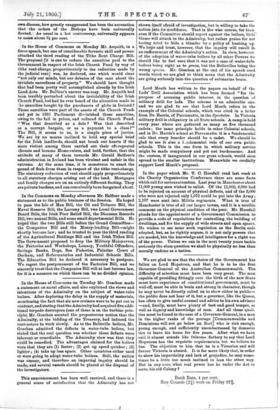In the House of Commons on Monday Mr. Asquith, in
a fierce speech, but one of considerable forensic skill and power, attacked the third reading of the Tithe Rent Charge Bill. The proposal [it is one to reduce the annuities paid to the Government in respect of the Irish Church Fund by way of tithe rent-charge, proportionately to the reduction made by the judicial rent] was, he declared, one which would clear "not only our minds, but our debates of the cant about the inviolate sacredness of property." We should have thought that had been pretty well accomplished already by the Irish Land Acts. Mr. Balfour's answer was easy. Mr. Asquith had been terribly perturbed about the inviolability of the Irish Church Fund, but had he ever heard of the alteration made in he annuities bought by the purchasers of glebe in Ireland ? Those annuities were part of the assets of the Church Fund, and yet in 1885 Parliament diminished those annuities, owing to the fall in prices, and reduced the Church Fund. "Was that described as a dole ? Was that described as a corrupt bargain, or as a payment to a class ?" The Bill, it seems to us, is a simple piece of justice. We are by no means inclined to hold any special brief for the Irish landlords, should not break our hearts if the more violent among them carried out their oft-repeated threats and became Home-rulers, and hold, farther, that the attitude of many of them towards Mr. Gerald Balfour's administration in Ireland has been virulent and unfair in the extreme. At the same time, it is monstrous to exact the pound of flesh from them in respect of the tithe rent-charge. The statutory reduction of rent should apply proportionately to all statutory charges arising out of the land. Mortgagee and family charges are on an entirely different footing. They are private burdens, and can conceivably be re-bargained about.


































 Previous page
Previous page